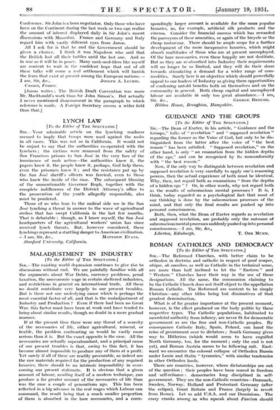GUIDANCE AND THE GROUPS
[To the Editor of THE SPECTATOR.] Sir,—The Dean of Exeter, in his article, " Guidance and the Groups," talks of " revelation " and " supposed revelation " regarding the former as the Voice of God, but only to be dis- tinguished from the latter after the voice of " the best reason " has been satisfied. " Supposed revelation," on the other hand, is only " an emanation from the hidden depths of the ego," and can be recognized by its nonconformity with " the best reason."
Now, if the only way to distinguish between revelation and supposed revelation is very carefully to apply one's reasoning powers, then the actual experience of both must be identical. Why, then, not regard both as emanations " from the depths of a hidden ego " ? Or, in other words, why not regard both as the results of subconscious mental processes ? It is, I think, today regarded as a psychological fact that most of our thinking is done by the subconscious processes of the mind, and that only the final results are pushed up into personal consciousness.
Both, then, what the Dean of Exeter regards as revelation and supposed revelation, are probably only the outcome- of subconscious mental processes suddenly pushed up into personal consciousness.—I am, Sir, &c.,








































 Previous page
Previous page